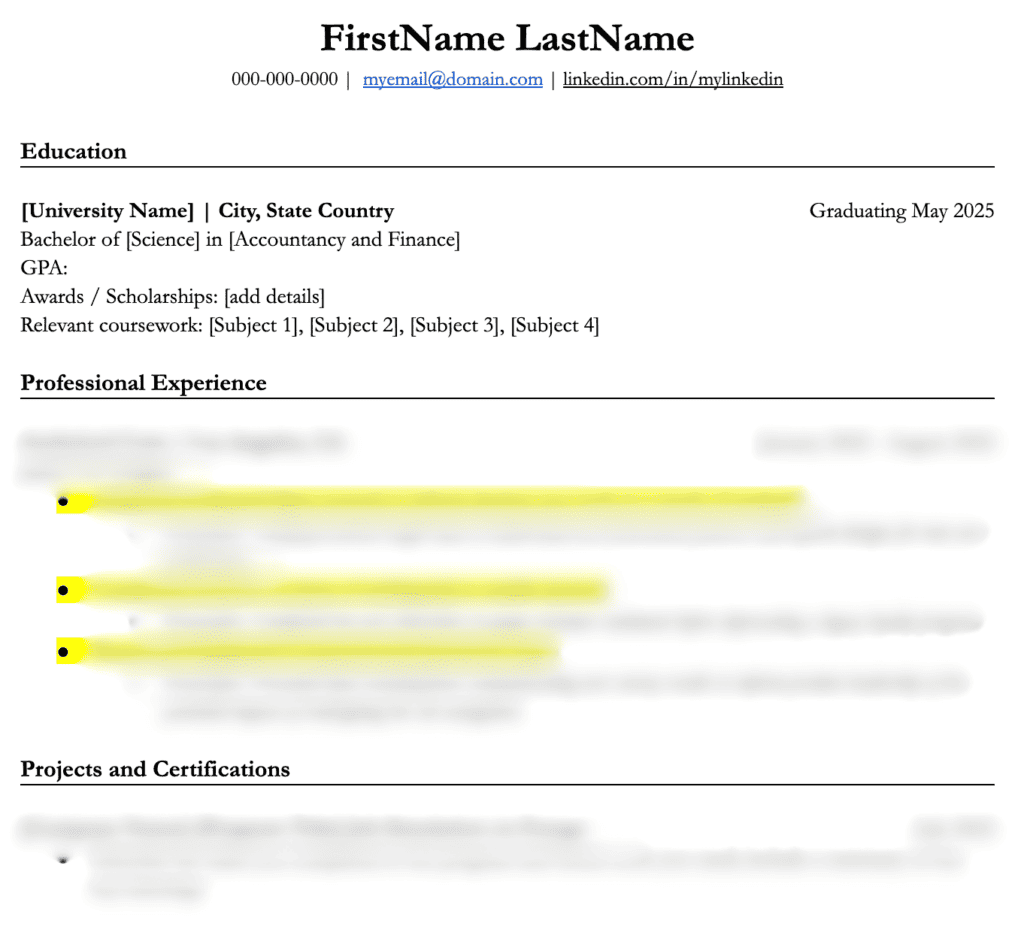If you’re looking for a job in 2025, chances are you’ll need stellar analytical skills. Analytical skills help you assess information and facts, problem-solve, and implement the best solutions. According to LinkedIn, they’re one of the top 10 most in-demand soft skills of 2024. So, what are some analytical skills examples and how can you improve yours?
Analytical Skills Definition
Analytical skills are the skills you use to make decisions and find solutions to problems. In the workplace, an analytical person helps the company problem-solve by breaking down information; looking through data and finding patterns, trends, and outliers; brainstorming new ideas; and making decisions on what solutions to implement.
If you’re like me, you might be thinking that analytical skills are usually just for data-heavy or analytical roles. But even as a more creative professional — working on writing and marketing — I’ve learned analytical skills are crucial to essentially any role. For example, I use analytical skills to understand which of my articles are performing well and which ones aren’t to help inform what I’ll write about next. Even though my primary role is to write content, analytical skills are key to prioritizing my work and ensuring what I’m writing is successful.
Companies hire people to help them solve problems, and analytical skills are what you use to do just that. You can use analytical skills in the workplace:
- In marketing, to review traffic to the website and understand what is (and isn’t) driving people to the site
- In data analytics, to identify seasonal trends in a company’s sales to understand the best time to launch a campaign
- In finance, to prepare forecasts of the company’s financial performance for the next year
- In user experience (UX) design, to understand current issues with the company’s UX while interviewing a user
- In sales, to create models to track revenue growth
- In software engineering, to see what parts of the software are performing as expected and which ones aren’t and why
- In human resources, to understand employee performance, turnover, and engagement
- In law, to comb through legal documents to develop legal arguments and strategies for clients.

Human Resources
Apply analytical skills in HR to analyze compensation data and make recommendations to managers about which employees should receive pay rises or adjustments.
Avg. Time: 3-4 hours
Skills you’ll build: Process mapping, empowering with insights, feedback giving, continuous improvement tools
Analytical Skills Examples
While analytical skills are a type of soft skill, you may apply hard skills to help you become a better analytical thinker. Analytical skills examples include data analysis, logical thinking, research, creativity, and communication.
>>MORE: Discover the right career for you based on your skills with a career aptitude test.
Data Analytics
Data analytics is a hard skill where you look at data to put numbers behind answers to questions or potential solutions. For example, you might use data analytics to answer what products have had the most success during the summer vs. winter months, or to create charts or graphs that show the company’s recent financial performance.
You don’t need to be a data analyst to use data analytics in your everyday work; in fact, it’s a valuable asset to your skill set to ensure the impact of your work, no matter what you do. Going back to my example of using data to help me understand article performance, being able to pull this data on my own and synthesize it into results and learnings is crucial for showing whether I’m performing well at work. Anyone can benefit from knowing how to pull and visualize the proof that their work is having an impact!
Examples of data analytics skills include:
- Programming languages (specifically SQL, Python, and R)
- Probability and statistical analysis
- Machine learning
- Microsoft Excel
- Data visualization
Logical Thinking
Logical thinking is when you use reason to analyze a situation and come up with a solution. There are a few different types of logical thinking, including:
- Inference: Assuming an answer based on facts we already know
- Inductive reasoning: Observing a specific pattern, then making a general conclusion
- Deductive reasoning: Observing a general premise, then applying it to a specific situation
For example, as a writer on a marketing team, I might use logical thinking, and specifically inductive reasoning, by taking action based on a specific trend I notice about my company’s audience. I may notice a specific pattern — for instance, that our audience is clicking on stories that have investment banking skills in them. Then, I could make the general conclusion that our audience values investment banking content. I would then test my hypothesis by writing more content on that topic, and hopefully increase our audience in the process.
Research
Analytical people seek all the facts and information before coming to a conclusion. A smart researcher knows where to find those facts and who to ask for help to get more information.
In the workplace, you might apply research skills to discover facts about the company’s history, like conducting a reflective analysis, and showing the company’s progress over the last five years. You could also do more qualitative research, and speak to colleagues in other departments to understand how a problem is affecting their team, or even set up an informational interview with an outside expert to learn from their experience.
Examples of research analytical skills include:
- Report writing
- Data collection and analysis
- Critical thinking
- User interviews
- Communication
- Sourcing
Creativity
Analytical skills aren’t just about facts and figures; they also require creativity to brainstorm solutions and possible answers to problems. Creativity helps analytical people move away from the small points and think big picture.
In the workplace, you might use creative thinking to organize a brainstorm with team members, or to propose product improvements based on a client survey. You could also use it to present information to stakeholders in a new, exciting way, or to create a new brand design for your company’s website. Creative thinking can be applied to numerous industries, even in more data-heavy or analytical roles.
Examples of analytical creativity skills include:
- Innovation
- Active listening
- Empathy
- Feedback
- Risk-taking
- Storytelling

Introduction to Strategy Consulting
Use creative thinking skills to generate ideas to help a fictional luxury clothing company increase sales revenue.
Avg. Time: 1-2 hours
Skills you’ll build: Critical thinking, creativity, brainstorming
Communication
Your analytical thinking won’t have an impact unless you share it with the team; however, not everyone can easily understand data or analytical problem-solving. Communication skills help you translate complex analytical ideas into digestible, actionable takeaways for the rest of your team.
For example, you can use communication skills to explain a data visualization to team members and help them understand company performance, or to present high-level findings from a data exercise or statistical analysis.
Examples of analytical communication skills include:
- Verbal communication
- Storytelling
- Chart, graph, and data presentation
- Public speaking
How to Show Your Analytical Skills on Your Resume
There are two types of ways to show your analytical skills on your resume: listing your hard skills in a “skills” section or explaining your analytical skills in your “experience” section.
“For early professionals, definitely showing the tools, the technical skills, and also projects you’ve worked on is important,” Kristen Rice, product manager, website growth at Sprout Social, says. “If you don’t have a particular project in mind or that you can share, showcase ideas that you do have around analytics. If you use a type of code such as SQL, Python, R etc., that is huge because businesses seek to automate analyses a lot quicker and there is an increasing need to connect data that doesn’t always share the same foundation. These different programming languages allow for the ability to do those things.”
For example, if you used your data analytics skills in a finance internship, you could write:
Used SQL queries to extract data and create reports that helped the team decrease surplus spending by 13% MoM.
Even if you’re talking about soft skills, you should include the impact your skills had. For example, as a writer, I might write something like:
- Performed competitive research analysis to identify three key improvement opportunities for our blog, leading to 10% traffic growth in two months
- Led brainstorming sessions to produce 30 new content ideas each month
- Conducted and shared analysis of top-performing content to inform future content strategy, leading to 20% MoM traffic growth
Log in to download a customizable resume template with examples of how to include analytical skills:

How to Talk About Your Analytical Skills in an Interview
You don’t need to know multiple coding languages or analytics programs to show off your analytical skills. You can also show analytical thinking through how you describe your problem-solving methods and approach at work.
In the interview, use the STAR method to show how you apply analytical skills and the impact your skills had. Even if you’re talking about soft skills, get specific about programs, tactics, or methodology you use when solving problems. This will give the interviewer a clear picture of how you work and problem-solve.
Consider:
- What do you first consult when solving a problem? Can you talk about any experience analyzing numerical results, looking at website analytics, etc.?
- What steps do you take to make sense of a problem?
- Who or what do you consult to help you solve the problem?
- How do you test and iterate your solution?
- How do you reflect on your solution? What steps do you take after?
For example, you might be asked about your decision-making process at work. You can respond with something like:
My decision-making process usually starts with gathering all the information I know about the problem, whether that’s by researching, collaborating with other teams, or performing data analysis. Once I have a better understanding of the problem, I’ll then share this information with my coworkers and ask them to brainstorm with me. After that, I’ll perform a risk analysis of all of the solutions we brainstormed and make a final decision on the best path forward.
>>MORE: Analytical Skills Interview Questions (and Answers)

BCLP Interview Success
Practice answering some of the most common interview questions.
Avg. Time: 4-5 hours
Skills you’ll build: Public speaking, poise, presentation, communication
How to Improve Your Analytical Skills
Even though some technical skills are involved in analytical thinking, much of analytical thinking relies on your soft skills — which means it’s harder to know how to be a better analytical thinker. However, by understanding your current problem-solving process and asking others about theirs, you’ll start to hone your analytical skills.
Document Your Current Skills
It isn’t easy to assess your current skill level if you don’t know how you currently use analytical thinking, even in your everyday life. The next time you approach a problem, even something like figuring out what to wear to dinner with friends, ask yourself:
- What facts am I considering here?
- What research do I do? Do I ask anyone for help, and who?
- How do I brainstorm solutions?
- How do I make my final decision on how to move forward?
- Do I reflect on my decision-making skills after, and if so, how does that affect my future decisions?
To use the dinner example, maybe you consider factors like the weather and the restaurant’s dress code when deciding what to wear. You might look up the weather using an app and research the restaurant online to see what the vibe is. Then, maybe you pull out a few options and try them on to see what you’re comfortable wearing.
This decision-making process might seem simple, but it’s a true skill! Improving your analytical skills starts with understanding how you uniquely solve problems.
Network With Other Teams
Learning from people around you can help you identify the problems they’re working on and show you how they may solve problems. You might learn about new resources or tools, or even just methods and tricks they use at work.
“Network with people in roles that you’re interested in,” Rice recommends. “I’ve connected with people on LinkedIn who are resources for me, internally at my organization I’ve had the opportunity to learn from our data science, data engineering, and business analytics team, and I also try to attend events or webinars that are geared towards analytics to build my knowledge and connections as well.”
Create Opportunities for Yourself
An analytical thinker will take in facts, do their research, brainstorm creative solutions, narrow down to the most logical one, and reflect on their solutions after the decision was made to learn for the next time. There’s no better way to improve your skills than to put yourself into situations where you need to exercise your analytical skills — whether that’s doing something simple like logic puzzles, or even putting yourself in a professional’s shoes and pretending you have to make a big company decision. Practice walking through these steps when you problem-solve and make a decision, whether big or small.
Practice Putting Your Analytical Skills in Context
It can be hard to know what it’s like to use analytical skills in the workplace if you’ve never had a full-time job before. With Forage job simulations, you can get free access to real-world work problems to practice using your analytical skills in a professional context.
Apply your analytical skills to real-world work situations in whatever industry interests you:
| Job simulation | What You’ll Do |
| JPMorgan Chase Investment Banking | Conduct analysis on suitable M&A targets to advise your client, WorldWide Brewing Co., on how to expand their operations in Asia |
| Red Bull On-Premise Sales | Analyze data about accounts to identify key trends and opportunities for sales growth and communicate your insights. |
| KPMG Career Catalyst Program: Audit | Assist in the audit planning process and communicate insights to the client. |
| Citi Markets Sales & Trading | Analyze the outcomes of an FOMC meeting and pitch a trade to your client. |
Analytics at Work: The Bottom Line
Analytical skills help you dig into problems and come out with facts-based solutions. While some technical skills like data analysis and visualization are elements of analytical skills, there are also soft skills like creativity and communication that are essential to being an effective analytical thinker.
No matter what kinds of analytical skills you have, show them off on your resume and in the interview by detailing your unique, informative analytical problem-solving process.
FAQs
Examples of analytical skills include data analytics, research, logical thinking, creativity, and communication. There are hard analytical skills, like data analytics, that help you use numbers to answer business questions, but also soft analytical skills, like creativity, that help you brainstorm potential solutions.
You can demonstrate analytical skills on your resume by either listing out data tools you use in a skills section or by describing scenarios in which you’ve used analytical skills in your experience section. In an interview, be sure to clearly outline what the problem was, who you worked with, any tools you used, and how your analytical skills led to the right solution.
Analytical skills can be hard or soft skills. Analytical hard skills are typically data or other tech tools that help you use numbers to answer questions or find solutions. Soft analytical skills are the ones you use when you’re thinking about how to solve a problem and how you figure out what strategic action to take.
Image Credit: olia danilevich / Pexels


